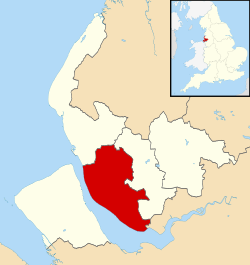
Back Liverpool Afrikaans ሊቨርፑል፣ እንግሊዝ Amharic Liverpool AN ليفربول Arabic ܠܝܒܪܦܘܠ ARC ليفربول ARZ Liverpool AST Liverpul Azerbaijani لیورپول AZB Liverpool BAN
Liverpool is a city and metropolitan borough in Merseyside, northwest England. It had a population of 486,100 in 2021.[8] The city is located on the eastern side of the Mersey Estuary, adjacent to the Irish Sea, and is approximately 178 miles (286 km) from London. Liverpool is the fifth largest city in the United Kingdom, and the largest settlement in Merseyside. The city forms part of a larger urban region of over 2 million people which extends into the neighbouring counties of Cheshire and Lancashire. Liverpool is part of the Liverpool City Region, a combined authority with a population of over 1.5 million.[12] [13][14][15]
Liverpool was established as a borough in 1207 in the county of Lancashire and became a significant town in the late seventeenth century, when the port at nearby Chester began to silt up. The Port of Liverpool became heavily involved in the Atlantic slave trade, with the first slave ship departing from the town in 1699. The port also imported much of the cotton required by the neighbouring Lancashire textile mills, and became a major departure point for English and Irish emigrants to North America. In the 19th century, Liverpool rose to global economic importance at the forefront of the Industrial Revolution and built the first intercity railway, the first non-combustible warehouse system (the Royal Albert Dock), and a pioneering elevated electrical railway; it was granted city status in 1880. In common with many British cities, the city entered a period of decline in the mid-20th century, though it experienced unprecedented levels of regeneration after it was selected as the European Capital of Culture in 2008.[16][17]
Liverpool's modern economy is diversified. The city has a significant influence on sectors such as tourism, culture, maritime, hospitality, healthcare, life sciences, advanced manufacturing, creative, and digital.[18][19][20] The city contains the second-highest number of national museums, listed buildings, and listed parks in the UK, with only London having more.[21] It is often used as a filming location due to its architecture, and was one of the top five cities in the UK most visited by overseas tourists in 2022. It is England's only UNESCO City of Music and has produced many notable musical acts, most notably the Beatles, while musicians from the city have released more chart-topping hit singles than anywhere else in the world. It has also produced countless actors, artists, poets, and writers. In sports, the city is known as the home of Premier League football teams Everton FC and Liverpool FC. The city's port was the fourth-largest in the UK in 2020, and numerous shipping and freight lines have headquarters and offices there.
Residents of Liverpool are often called "Scousers" in reference to scouse, a local stew made popular by sailors in the city, and the name is also applied to the distinct local accent. The city has a culturally and ethnically diverse population and historically attracted many immigrants, especially from Ireland, Scandinavia, and Wales. It is the home of the earliest black community in the UK, the earliest Chinese community in Europe, and the first mosque in England.[22]
- ^ "How Liverpool became known as 'the capital of North Wales'". March 2021. Retrieved 1 March 2021.
- ^ "Second capital of Ireland: Liverpool's unique Irish history and culture and what it means to the city". 25 July 2021. Retrieved 23 August 2022.
- ^ "It's official – Liverpool rocks!". Retrieved 31 October 2020.
- ^ "Is Liverpool still the world in one city?". Retrieved 1 May 2010.
- ^ "Council". Liverpool City Council. Retrieved 16 December 2023.
- ^ "Mid-Year Population Estimates, UK, June 2021". Office for National Statistics. 21 December 2022. Retrieved 18 October 2023.
- ^ "OS Open Built Up Areas". Ordnance Survey. December 2022. Retrieved 9 January 2024.
- ^ a b "The population reached nearly 490,000". www.ons.gov.uk. Retrieved 29 December 2023.
- ^ Oinn, Su; Bubb, Emma; Jenkins, Joe (2 August 2023). "Towns and cities, characteristics of built-up areas, England and Wales: Census 2021". Office for National Statistics. Retrieved 9 January 2024.
- ^ a b UK Census (2021). "2021 Census Area Profile – Liverpool Local Authority (E08000012)". Nomis. Office for National Statistics. Retrieved 8 August 2023.
- ^ Fenton, Trevor (25 April 2023). "Regional gross domestic product: local authorities". Office for National Statistics. Retrieved 13 December 2023.
- ^ Fenton, Trevor (25 April 2023). "Regional gross domestic product: city regions". Office for National Statistics. Retrieved 2 September 2023.
- ^ "Rebalancing Britain: Policy of Slogan? Liverpool City Region - Building on its Strengths: An independent report" (PDF). www.assets.publishing.service.gov.uk. Retrieved 10 January 2024.
- ^ "Liverpool City Region Combined Authority Rights of Way Improvement Plan 2018-2028" (PDF). www.wirral.gov.uk. Retrieved 10 January 2024.
- ^ "Liverpool City Region Statement of Cooperation on Local Planning. Liverpool City Region Combined Authority" (PDF). www.api.liverpoolcityregion-ca.gov.uk. Retrieved 11 January 2024.
- ^ "Report on the Nominations from the UK and Norway for the European Capital of Culture 2008" (PDF). Archived from the original (PDF) on 19 August 2008. Retrieved 11 July 2008.
- ^ "Liverpool, European Capital of Culture: 2008 – 2018". 6 April 2018. Archived from the original on 27 May 2022.
- ^ "Liverpool to become £80m investment zone". www.lbndaily.co.uk. 15 March 2023. Retrieved 3 January 2024.
- ^ "Economy of Liverpool". www.varbes.com. Retrieved 3 January 2024.
- ^ "'Liverpool's economy will thrive' says Prof Parkinson". www.lbndaily.co.uk. 8 August 2022. Archived from the original on 8 August 2022. Retrieved 3 January 2024.
- ^ Cite error: The named reference
visitliverpoolwas invoked but never defined (see the help page). - ^ "Help Restore & Expand England's First Mosque". www.abdullahquilliam.org. Retrieved 8 October 2023.
© MMXXIII Rich X Search. We shall prevail. All rights reserved. Rich X Search









